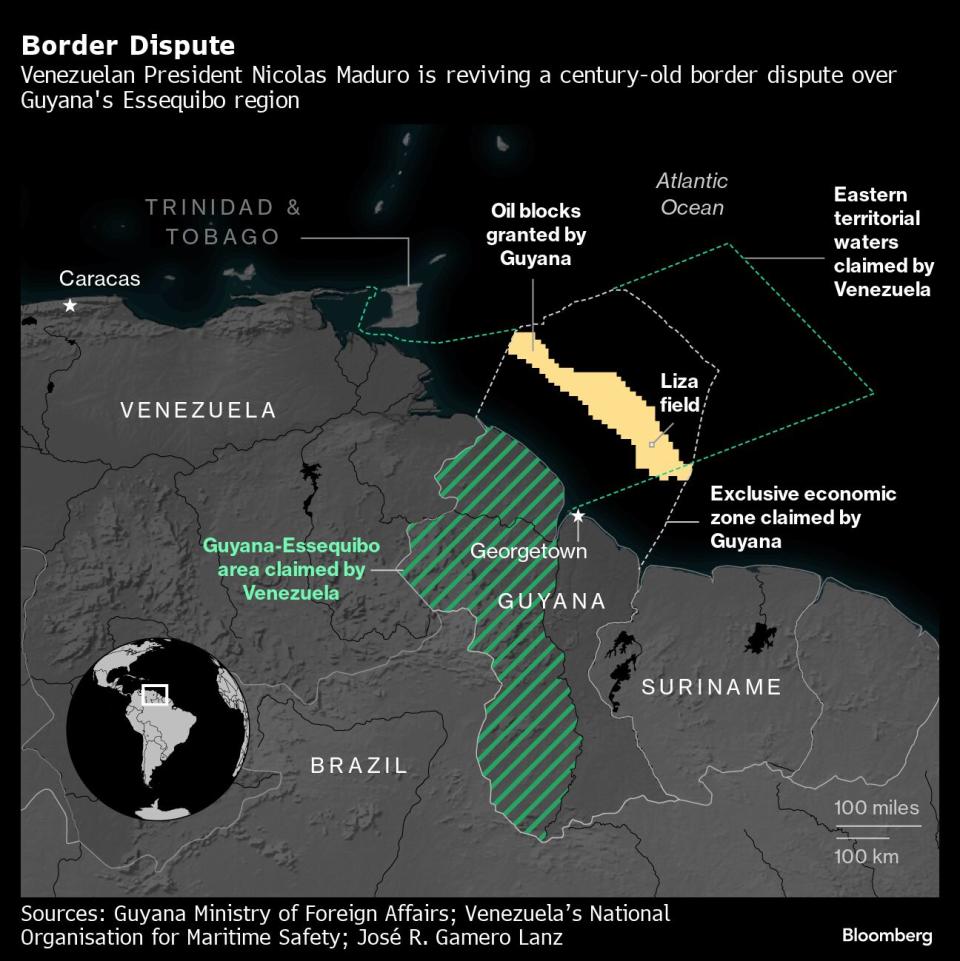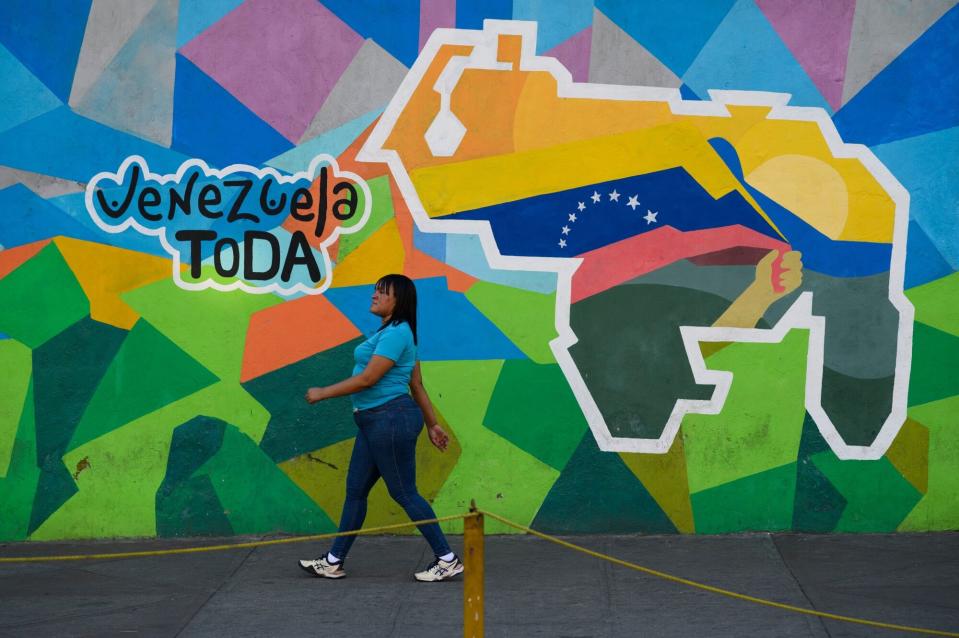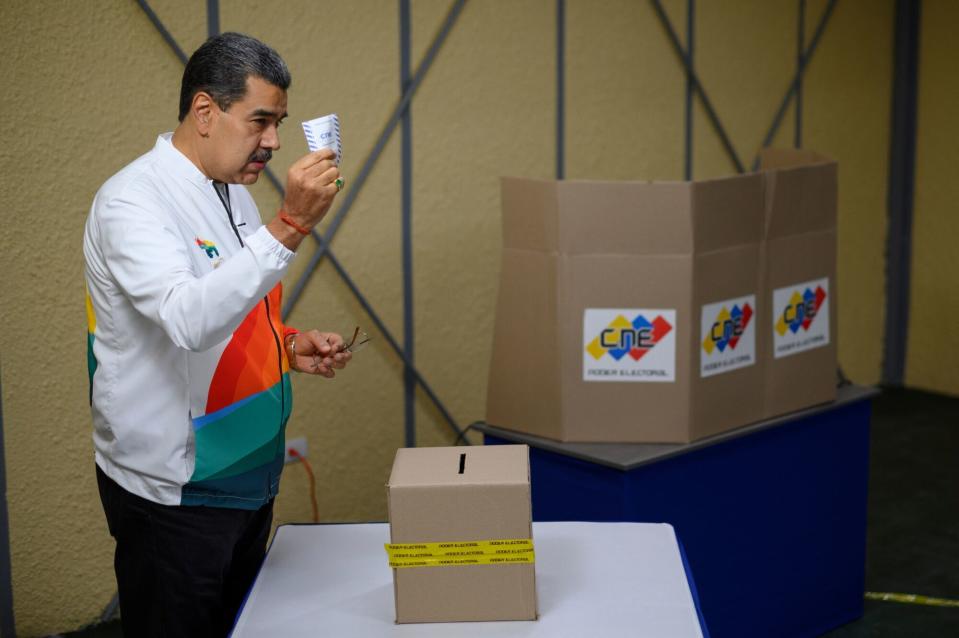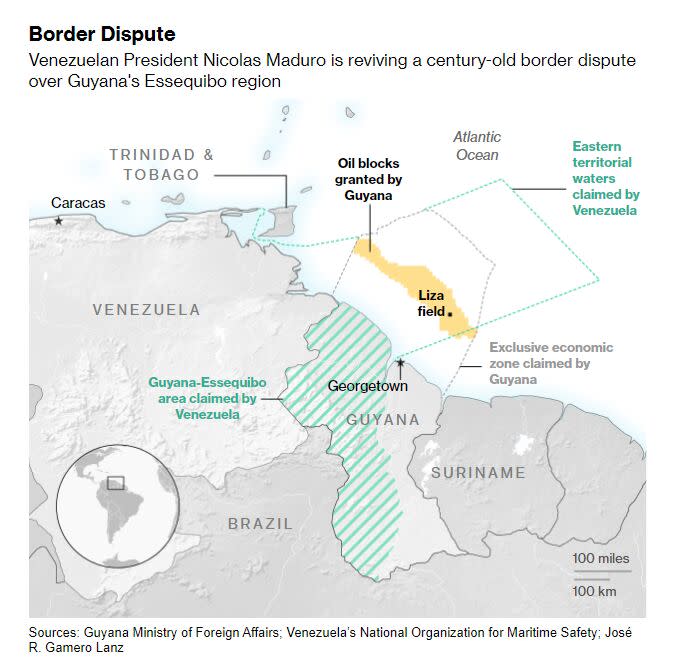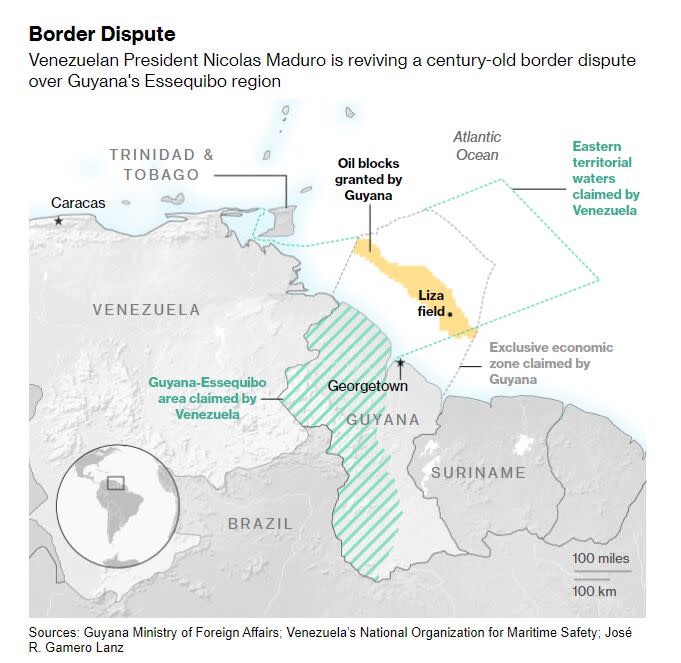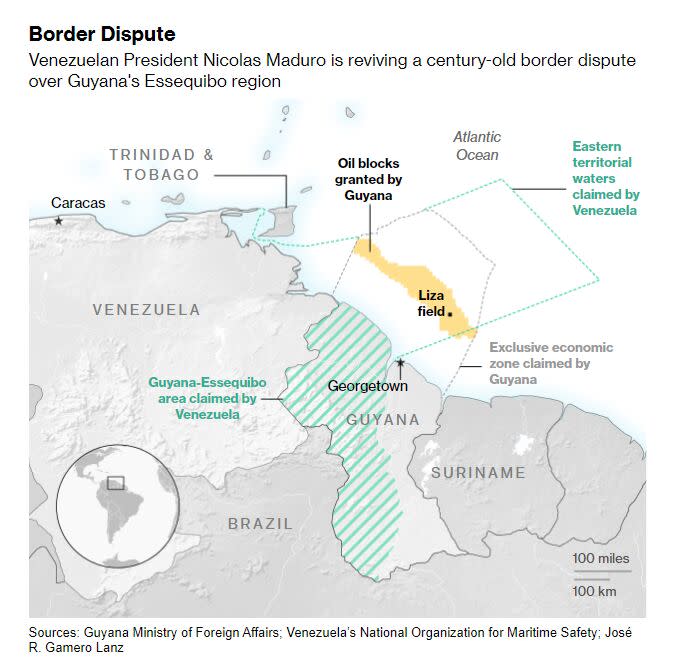Why Venezuela Deployed Troops to Guyana Border
- Oops!Something went wrong.Please try again later.
- Oops!Something went wrong.Please try again later.
(Bloomberg) -- Venezuela and Guyana have disagreed over their common border for well over a century. That disagreement has grown far more tense since large deposits of oil were found in the contested Essequibo region. In early December, Venezuelan President Nicolás Maduro announced plans to annex the Essequibo, covering roughly two-thirds of Guyana’s territory. A few days later, Maduro and Guyana’s president, Irfaan Ali, met and agreed not to use force to resolve the dispute. While the arrival of a British Royal Navy warship for joint exercises with Guyana prompted Maduro to deploy over 5,000 soldiers and numerous vessels and planes to his country’s east coast, Venezuela’s Defense Minister said he pulled back troops after the warship withdrew. Leaders from across the continent, where political instability is common but armed conflict between countries is historically rare, are seeking to de-escalate the dispute.
Most Read from Bloomberg
Confidential Jeffrey Epstein Documents Unsealed by New York Court
Fed Sees Rates Staying High for Some Time With Cuts Eyed in 2024
Saving the Panama Canal Will Take Years and Cost Billions, If It’s Even Possible
Tech Stocks Log Four-Day Losing Streak, Bonds Rise: Markets Wrap
Deadly Iran Blasts and Red Sea Warnings Fan Mideast Tensions
1. What is the fight about?
Maduro’s threats focus on drilling rights granted by Guyana to big oil companies in the Atlantic Ocean, north of the Essequibo — a 61,600 square mile area both nations claim as their own. The majority of Guyana’s discovered oil riches are located mainly in the Stabroek bloc, where Exxon Mobil Corp. discovered 11 billion barrels of off shore resources, the biggest find of the past decade. A conglomerate led by Exxon actually produces all of Guyana’s oil exports, which amount to about 333,000 barrels of oil a day in November, or two thirds of Venezuela’s output. Revenues from these exports are set to grow to $7.5 billion in 2030 from $1 billion last year, according to Rystad Energy. Other companies involved are Hess Corp. and China’s CNOOC Ltd. Chevron Corp., which has operations in Venezuela, will step in the first half of next year after its $53 million acquisition deal of Hess is finalized. Production is on course to reach one million barrels a day by the end of the decade, according to Platts.
2. What are Maduro’s plans?
After staging a referendum that purportedly showed overwhelming support for Venezuela to take control of the region, Maduro said he would move to establish a new Venezuelan state dubbed Guyana Essequibo. He plans to grant citizenship to residents of the sparsely populated the jungle territory, establish two new state-owned companies and a new military post, and start awarding oil and mineral licenses to develop the region. It amounts to an ambitious undertaking for a country that has suffered through one of the worst economic crises in recent history despite being on top of the world’s largest oil reserves. Yet Venezuela’s 2024 budget includes defense of the Essequibo for the first time. The goals would be further complicated by the fact that Maduro has little to no access to financing and that the majority of the Essequibo lacks proper roads, water and electricity services. Maduro has also ordered a three-month ultimatum for oil companies drilling in disputed land to exit, a step that could risk his relationship with close allies like China, which has stakes there.
3. What’s the background?
The South American neighbors have been disputing their boundary since the 1800s, with Venezuela claiming everything west of the Essequibo River — about two-thirds of what Guyana considers its territory. In 1899, an international arbitration panel awarded Britain the territory. Then, both countries signed a treaty in Geneva to resolve the controversy in 1966, the same year that Guyana gained independence from Britain. After decades of bilateral negotiations and further mediation of the United Nations failed to yield results, the UN referred the controversy to the International Court of Justice in 2018, as Guyana expected and still wants. But Venezuela hasn’t recognized the ICJ’s jurisdiction. It says the Geneva agreement would provide the only valid resolution.
4. What could the conflict lead to?
The controversy is complicated by the way it could overlap with Venezuela’s current political crisis, with presidential elections scheduled for 2024 and polls showing Maduro lagging badly behind opposition candidate María Corina Machado. Military experts doubt that the dispute with Guyana would lead to actual armed conflict unless Maduro sees his grip on power at risk. If the opposition unifies ahead of next year’s presidential vote and leaves him with no possibility but to offer concessions toward free and fair elections, analysts believe Maduro could escalate the situation and issue an emergency decree and potentially postpone the elections. Despite its economic woes, Venezuela has a significantly larger military power than Guyana, with some experts estimating the imbalance at 100-1. However, if Guyana’s allies intervene, the balance could shift. Guyanese officials have boasted of the country’s international military alliance with the US, among others.
5. How has the international community and the oil market reacted so far?
Members of the international community, particularly Brazil’s President Lula da Silva, have expressed their concern regarding the rising tensions and have called for dialogue. Brazil played an active role with others in promoting the Dec. 14 meeting between the presidents of Venezuela and Guyana that led to the so-called Argyle Declaration. While there hasn’t been any significant reaction in the oil market so far, Exxon has said it was keeping a close eye on the situation and Chevron’s CEO Mike Wirth saying talks are more likely than war. Lastly, Guyanese President Ali has said foreign oil companies are “moving ahead aggressively” with production plans despite Venezuela’s threats to take over the region.
(Updates first paragraph with events from December 31.)
Most Read from Bloomberg Businessweek
©2024 Bloomberg L.P.

